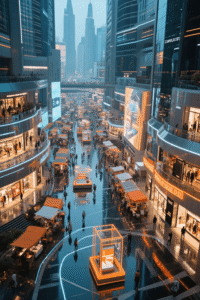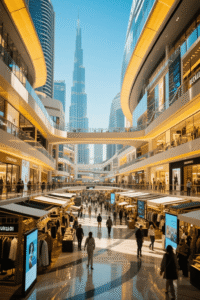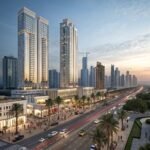Let’s be honest – predicting the future of any market is tricky, especially one as dynamic as retail in Dubai!
You’ve probably heard a lot of forecasts and projections about the region’s shopping scene. But what truly matters is understanding the forces shaping its trajectory .
The landscape is shifting rapidly with new technologies, evolving consumer preferences, and ambitious government initiatives.
Discover how these trends are poised to impact businesses over the next three years – gaining a crucial advantage in this booming market.
Let’s dive into the key drivers shaping the Dubai retail landscape, and what you need to know for a successful 2025 outlook.
Dubai Retail’s Shifting Sands
It’s easy to get lost in the glittering headlines about Dubai’s retail boom – the luxury brands, the mega-malls, the sheer scale of it all. But that picture only tells half the story.
The truth is, the foundations beneath this growth are shifting, and ignoring those changes could leave you vulnerable. Current projections show a significant shift away from traditional high street shopping.
While some retailers continue to focus on attracting foot traffic with extravagant experiences, others are quietly building digital ecosystems that drive sales – and retain customers – far more effectively.
The key isn’t simply about having the best location; it’s about understanding how consumer behavior is evolving in a hyper-connected world.
Every moment spent on flashy promotions or elaborate store designs could be invested in building that crucial digital presence and tailoring experiences to meet changing demands.
And here’s what many analysts aren’t openly discussing: the future of retail in Dubai hinges on adaptability, not just ambition. It’s about anticipating where customers are spending their time – and their money – before anyone else does.
Let’s dive into exactly what those shifting sands look like…
E-Commerce Dominance & Fragmentation
E-commerce dominance in Dubai retail is accelerating at a rapid pace – it’s truly reshaping how consumers shop. You’re seeing more and more people turning to online platforms for almost everything from electronics to fashion to groceries. This isn’t just a trend; it’s becoming the primary way many shoppers experience the market.

The rise of major players like Noon, Amazon UAE, and local e-commerce giants is driving this shift. But here’s where things get interesting – alongside this overall dominance, you also see significant fragmentation. Smaller, specialized online stores are thriving, catering to niche markets and offering unique products that aren’t always available on the larger platforms. This creates a really diverse retail landscape.
Luxury Retail’s Resilience & Evolution
Often, when considering the Dubai retail market, there’s a strong narrative about growth – and that’s certainly true. However, looking specifically at luxury retail, you see a fascinating story unfolding.
The core resilience of this sector is rooted in Dubai’s continued attractiveness as a global hub. It’s not just about the volume of tourists; it’s about the sustained interest from high-net-worth consumers worldwide. This means that brands are willing to invest here, recognizing the market’s potential for long-term growth and access to diverse clientele.
Think about flagship stores – these aren’t just temporary pop-ups; they represent a serious commitment from luxury houses wanting to be at the heart of this dynamic retail environment. The continued presence of established brands alongside emerging designers speaks volumes about confidence in Dubai’s ability to nurture and support luxury offerings.
Evolution is key here too. You’re seeing a shift towards experiences, not just products. Consumers are increasingly seeking personalized services, exclusive events, and opportunities for engagement with the brand – think bespoke tailoring, private shopping appointments, or curated exhibitions.
This isn’t about simply buying a handbag; it’s about becoming part of an ecosystem around that brand. Retailers are responding by creating spaces that foster connection and build lasting relationships, which is absolutely vital for maintaining luxury retail’s appeal in the future.
The Rise of Experiential Shopping
It’s like this – the retail landscape in Dubai is changing dramatically, and at its heart lies a shift towards something much more than just buying products. You’re seeing a real buzz around “experiential shopping,” and frankly, it’s becoming a huge driver for growth.
Think about what attracts shoppers these days – it’s not simply finding the best price. Consumers are craving experiences; they want to *feel* something when they shop. Retailers are responding by creating spaces that offer more than just merchandise.
This could be anything from interactive brand installations where you can test products, to hosting workshops and events – think cooking classes in a department store or art demonstrations in a luxury boutique. The goal is to create memorable moments that connect the customer with the brand on an emotional level. It’s about turning shopping into entertainment.
Furthermore, there’s a huge demand for personalized experiences. You see this reflected in smaller, curated boutiques offering bespoke services and tailored recommendations – going beyond just a transaction to build a genuine relationship with the customer.
This trend is fuelled by technology too; augmented reality apps that let you virtually ‘try on’ clothes or interactive displays that provide product information are becoming increasingly popular, adding another layer of engagement to the shopping journey.
Sustainability’s Impact on Retail Choices
Every retailer in Dubai is starting to seriously consider sustainability – it’s no longer just a nice-to-have; it’s becoming absolutely essential.
Consumer preferences are shifting dramatically. You’re seeing a huge increase in demand for products that are ethically sourced and environmentally friendly. This isn’t just about feeling good; there’s a genuine desire to make conscious purchasing decisions.
Brands offering sustainable options – whether it’s clothing made from recycled materials, electronics with reduced packaging, or food products with lower carbon footprints – are attracting significantly more attention and loyalty. This trend is particularly strong among younger demographics who prioritize values alongside price and quality.
Regulations are tightening too. The government of Dubai has introduced initiatives to promote sustainable practices across various sectors, including retail. These measures include incentives for businesses adopting eco-friendly technologies and stricter guidelines regarding waste management.
You’ll notice a growing emphasis on reducing plastic packaging, promoting circular economy models (like resale and repair), and investing in renewable energy sources within retail operations. It’s creating a powerful pressure to adapt – or risk falling behind.
Community Engagement & Local Brands
True, let’s dive into how community engagement and local brands are shaping the Dubai retail landscape – particularly looking ahead to 2025.
Community-focused initiatives are becoming increasingly vital for retailers in Dubai. It’s about more than just selling products; it’s about building connections with the people who live here.
You see this reflected in collaborations between major brands and local artisans, showcasing traditional crafts and skills. Many businesses are now hosting workshops and events that celebrate Emirati culture – think pottery classes or demonstrations of falconry. This type of engagement helps foster a sense of belonging and loyalty amongst consumers. It’s creating brand experiences that go beyond the transactional.
Local brands, in particular, are gaining significant traction. There’s a real appetite for products that reflect Dubai’s unique identity and heritage
You’re seeing a surge in startups focused on sustainable fashion, locally-sourced food products, and bespoke designs – things that resonate with consumers who value authenticity and supporting the local economy. These brands are Managing social media to build strong communities around shared values, further amplifying their reach and impact. By 2025, it’s predicted this trend will only accelerate as consumer preferences shift towards more conscious and community-driven choices.
Tourism’s Role – Seasonal Demand
During peak tourist seasons, the Dubai retail market experiences a significant surge in demand. You see this clearly reflected in sales figures as visitors flock to the city seeking luxury goods, souvenirs, and fashion items.
The timing is intrinsically linked to visitor numbers. The winter months – particularly November through March – represent the busiest period for tourism in Dubai. This influx of shoppers directly translates into increased revenue for retailers across various sectors, from high-end department stores to smaller boutiques selling locally crafted goods.
The volume of purchases often exceeds what local residents typically buy during this time, creating a concentrated burst of activity within the retail landscape. It’s not uncommon to see promotions and special offers introduced specifically targeting tourists capitalizing on this seasonal demand
Furthermore, many tourist-focused retailers operate with a degree of flexibility in their inventory management, anticipating these peak periods by stocking popular items and brands favored by international visitors. This proactive approach is crucial for meeting the heightened purchasing needs during the busiest times.
Adapting to Hyper-Personalized Consumption
What is happening in Dubai’s retail landscape right now is fascinating – and it’s all about adapting to how you, the shopper, wants things. ‘Hyper-personalized consumption’ isn’t just a buzzword; it’s fundamentally changing how retailers operate.
Data is king, quite simply. Retailers are collecting massive amounts of information about your preferences – what you buy, when you buy it, even where you look within stores. They’re using this data to create incredibly tailored experiences.
Imagine receiving a notification on your phone suggesting a specific product based on your recent browsing history or past purchases. Or picture targeted promotions delivered via email showcasing items you’ve shown interest in, but haven’t yet bought. This level of relevance is becoming the norm and it’s driven by sophisticated algorithms.
The rise of ‘omnichannel’ retail is key to this trend. You might discover a product online, then buy it in-store – or vice versa. Retailers are integrating these channels seamlessly, creating a fluid shopping journey that anticipates your needs and preferences at every step.
This means personalized recommendations aren’t just limited to the digital world; they’re being applied in physical stores too – perhaps a sales assistant knowing your preferred size or style based on previous interactions.
Digital Transformation & Retail Tech
Digital transformation & retail tech is rapidly reshaping the Dubai retail market. You’ll see a huge shift towards technology-driven experiences for shoppers.
This means more investment in areas like mobile shopping apps, personalized recommendations, and seamless omnichannel experiences – where you can start browsing on your phone and complete the purchase in-store.
You’re already seeing retailers using augmented reality to let you ‘try on’ clothes virtually or visualize furniture in your home before buying. Data analytics are also playing a massive role, allowing stores to understand customer preferences better and tailor their offerings accordingly. It’s about making shopping more convenient and engaging for you!
The Metaverse and Immersive Retail
Despite advancements in traditional retail, the Metaverse and immersive retail represent a significant shift in how you might experience shopping. It’s about moving beyond simply browsing products online to actively engaging with them in entirely new ways.
You’re going to see an increasing trend toward brands creating virtual stores where you can ‘try on’ clothes digitally, explore furniture in your own home through augmented reality, or even attend a virtual fashion show – all from the comfort of your device.
Imagine being able to virtually “walk” through a new shoe store and see how different styles look on your feet before you commit to buying them. Or perhaps exploring a luxury car’s interior in 3D, customizing it, and even taking a virtual test drive – all without leaving your living room. This level of interactive experience is what the Metaverse promises.
Supply Chain Disruptions & Resilience
When considering the Dubai retail market, understanding supply chain resilience is absolutely critical.
Recent disruptions have highlighted vulnerabilities within the region’s logistics networks – creating significant challenges for businesses operating there.
These disruptions stemmed from a combination of factors including geopolitical instability and increased global shipping costs. These events impacted everything from import delays to fluctuating product availability, directly affecting retailers’ ability to meet consumer demand.
Building resilience within the supply chain is now paramount for any business operating in Dubai.
This means diversifying sourcing options – don’t rely on a single supplier or region. Investing in robust inventory management systems and exploring near-shoring strategies are also key steps. Furthermore, developing strong relationships with logistics partners who demonstrate adaptability and proactive risk assessment is crucial.
Ultimately, prioritizing supply chain flexibility allows you to navigate potential disruptions effectively – ensuring continued operation and customer satisfaction within the dynamic Dubai retail landscape.
Government Regulations & Retail Landscape
So, government regulations play a significant role in shaping the Dubai retail market. These rules impact everything from store openings to product offerings.
You’ll notice that the UAE has been steadily increasing its focus on local businesses and supporting domestic brands. This translates into preferential treatment for shops owned by Emiratis – think tax breaks and streamlined approval processes.
The government is actively encouraging a shift toward “Made in the UAE” products, aiming to boost national industries and reduce reliance on imports. You’ll see this reflected in marketing campaigns and initiatives designed to promote local goods.

Furthermore, regulations surrounding import duties and taxes are constantly evolving – often influenced by global trade agreements and Dubai’s strategic location as a regional trading hub. These changes directly affect the cost of goods sold for retailers.
You’ll find that fluctuating tariffs on certain products can significantly impact a retailer’s profitability, demanding constant monitoring and adaptation to maintain competitive pricing. It is something you need to be aware of when planning your business strategy.
Ultimately, understanding the complex interplay between government regulations and the retail landscape in Dubai is crucial for any business operating there – especially if you are considering expansion or simply trying to navigate the market effectively.
2025 Outlook – Smart Retail Future
Now, looking ahead to 2025 for Dubai’s retail market, the ‘Smart Retail Future’ is really shaping up to be a huge deal. It’s about how technology will change everything you buy and experience.
Think about it – stores are becoming more than just places to shop; they’re turning into interactive hubs.
You might order groceries online and have them delivered by drone, all managed through an app on your phone. Or you could try out a new clothing brand in a virtual reality fitting room before buying it.
Personalization is key – retailers will use data to understand exactly what you want and recommend products tailored just for you. This means more targeted advertising and offers, of course.
It’s not just about convenience; it’s about creating a truly connected shopping experience that anticipates your needs and makes every purchase feel special. 2025 will be the year Dubai retail really embraces this smart approach!
Decoding Dubai’s Retail Future: It’s Not Just About Luxury!
Businesses that truly understand what’s shifting in Dubai retail will be the ones thriving by 2025.
The market is evolving far beyond simply high-end luxury; a significant surge in demand for accessible, experience-driven retail and specialized offerings is taking hold. Consumers are seeking convenience, personalization, and unique experiences that go beyond traditional shopping. Data reveals a growing preference for omnichannel strategies – seamless integration of online and offline channels – alongside a rising interest in sustainable and ethical brands. Furthermore, the continued expansion of tourism and diverse demographics are fueling demand for specific product categories like health & wellness, tech gadgets, and family-oriented entertainment.
Ignoring these trends risks being left behind as consumer preferences shift dramatically. Proactive adaptation – investing in digital transformation, understanding local cultural nuances, and prioritizing customer experience – is paramount to capturing market share. Businesses that embrace this dynamic landscape will see increased revenue streams and establish a strong competitive advantage.
Don’t wait for the future to arrive; shape it! Invest in research, adapt your strategies, and seize the incredible opportunities presented by Dubai’s evolving retail market – build a resilient and successful business today.
Disclaimer: the information provided is subject to change based on updates or modifications to local laws and regulations.




Leave a comment